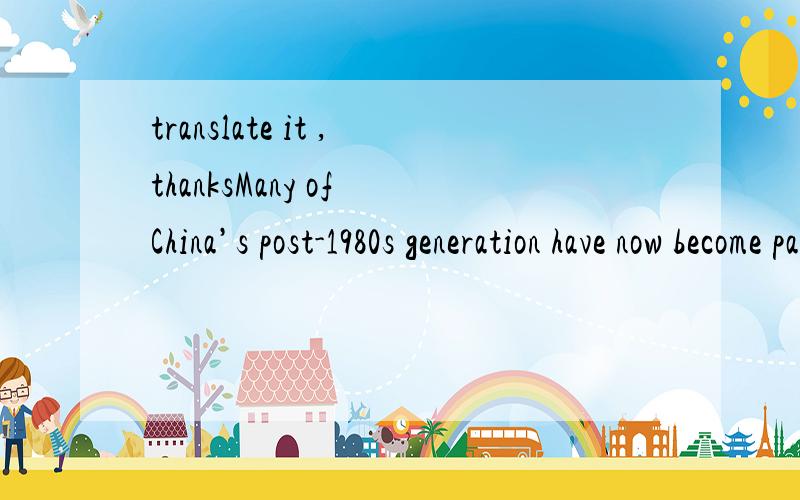translate it ,thanksMany of China’s post-1980s generation have now become parents."RMB 1,000 for the nursery and RMB 5,000 for the kindergarten,” a post on a popular Internet site says.The author explains that it costs RMB 450,000 to raise a chil
来源:学生作业帮助网 编辑:作业帮 时间:2024/04/28 07:07:12

translate it ,thanksMany of China’s post-1980s generation have now become parents."RMB 1,000 for the nursery and RMB 5,000 for the kindergarten,” a post on a popular Internet site says.The author explains that it costs RMB 450,000 to raise a chil
translate it ,thanks
Many of China’s post-1980s generation have now become parents."RMB 1,000 for the nursery and RMB 5,000 for the kindergarten,” a post on a popular Internet site says.The author explains that it costs RMB 450,000 to raise a child through to the sixth grade."A whole family,s monthly income is spent on the child ; every minute you have is used earning money for your child your moods are hugely affected by your child,s; friends,career and fun all belong to your pre-child life; youM sell your house to get your child into a better school.And this,according to sina .com,means a generation of "child slaves" has been created.With thousands of people blogging in China,s cyber space,a new group of bloggers have made a name for themselves by blogging about raising children.These young parents who regularly blog about their children,s daily lives,exchange tips and post hundreds of cute photos of their toddlers > are divided about whether they are slaves to their children.Gao Jia,who is about to have a baby,thinks she^s a ‘‘slave-to-be,and looks forward to it."It’s my responsibility to raise the next generation.” Blogger Baobao,on the other hand,thinks she is a "child farmer,rather than a child slave."Pm raising my child like a farmer planting baby trees.Wen Ma,who also writes her own child-raising blog,criticizes the popular Chinese saying "everything we do is for the kids".She continues,"We take both that saying and kids too seriously; for our children,s sake,we cannot be child slaves.It makes us weak.Huan Zi doesn,t think child slave correctly describes her generation of parents."We can be apartment slaves,because we need an apartment to live in,but it’s our own choice to have children,she says."There will come the time when the post-1980s generation finds their own place in life,but being slaves should not be it.
随着越来越多的80后结婚生子,养育下一代的重担也开始在他们身上负载.毒奶粉、名校风……在这个充满危险又花费高昂的社会里,80后的父母们为保护孩子劳心劳力,于是他们中间的一部分被赋予了“孩奴”称号
translate it ,thanksMany of China’s post-1980s generation have now become parents."RMB 1,000 for the nursery and RMB 5,000 for the kindergarten,” a post on a popular Internet site says.The author explains that it costs RMB 450,000 to raise a chil
中国很多的80后现在已经是父母了.“1000块钱的托儿所,5000块钱的幼儿园.”以为80后在一家很受欢迎的网站上这样说.作者解释说,要把孩子养到六年级得花45万.
整个家庭一个月的收入都花在孩子身上了;你每一分钟都在为孩子挣钱.你的心思完全被孩子的交友,事业和娱乐所影响,这都属于成人之前的问题.你可能为了让孩子得到更好的教育把房子卖掉.
这种情况,根据新浪网站说,意味着“孩奴”一代的产生.随着中国成千上万的人加入微博大军,一种电脑圈子,一群新的“博客”已经给他们自己开了博客来探讨怎么抚养孩子.
这些年轻的父母经常上博客晒他们自己孩子的日常生活,交流经验,上传成败张可爱孩子的照片,已经完全把他们自己归为“孩奴”了.
即将有自己的孩子的高佳认为:他马上就会成为“奴隶”了,而且很向往,“养育下一代是我的责任.”,相反的,博客宝宝认为她是个“孩子农民”而不是一个“孩奴”.“我养孩子就像一位农民栽培一棵小树.”也写自己养育经历博客的文华批判了中国的老话:我们做的每件事情都是为了孩子.她接着说:“我们把老话和孩子都看得太重了;为了我们的孩子着想,我们不该成为奴隶.这会使我们太累.欢子认为“孩奴”并不能确切的描述他们这一代父母.“我们可能成为房奴,因为我们需要房子来住,但是要不要孩子是自己的选择”,她说,“当80后找到自己在生活中的位置以后,成为奴隶这种问题就不会出现了.”